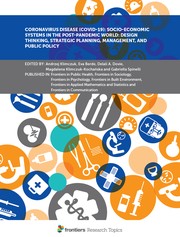Check nearby libraries
Buy this book

On 11 March 2020, the World Health Organization declared a pandemic of the COVID-19 coronavirus disease that was first recognized in China in late 2019. Among the primary effects caused by the pandemic, there was the dissemination of health preventive measures such as physical distancing, travel restrictions, self-isolation, quarantines, and facility closures. This includes the global disruption of socio-economic systems including the postponement or cancellation of various public events (e.g., sporting, cultural, or religious), supply shortages and fears of the same, schools and universities closure, evacuation of foreign citizens, a rise of unemployment, changes in the international aid schemes, misinformation, and incidents of discrimination toward people affected by or suspected of having the COVID-19 disease. The pandemic has brought to the fore unpreparedness in critical areas that require attention, amid prospects and challenges. Moreover, considerable reorganization efforts are required with implications for assets, resources, norms, and value systems. COVID-19 is challenging the concept of globalization and stimulating responses at the levels of local and regional socio-economic systems that lead to the mobilization of assets that have been unrecognized earlier on, such as various forms of economic capital, social capital, cultural capital, human capital, and creative capital. For example, through digital channels, local groups are forming to create schemes of support for physical and mental wellbeing. These emerging exchanges lead to various social and technological innovations by building on skills and assets that are less important in the free-market economy, such as empathy, skills for crafts, making and fixing; locally grown microgreens; and micromanufacturing. Isolation and local living are also making it much harder to ignore the civic responsibilities towards communities, meant as individuals, vulnerable groups, and local businesses. Whilst the pandemic is limiting physical participation, this challenging time is uncovering alternative ways of mutual support, which may create long-term benefits for socio-economic systems, including environmental and biodiversity protection, reduction of the air pollution, and climate action. The pandemic’s threat to public health will hopefully be overcome with implications for disruption for an extended period that we are unable to forecast at this stage. It is key to focus on studies recognizing the activities and interventions leading to the recovery of socio-economic systems after the pandemic. Reflecting and planning on how societies and economies will go back to “business as usual” requires new forms of communication and cooperation, imaginative design thinking, new styles of management, as well as new tools and forms of participation in various public policies. Many questions related to the care of the vulnerable, economic restart, and the risk of future pandemics, to mention but a few, are already occupying the academic, scientific, experts, and activist communities, who have started to imagine the “new normal.”
Check nearby libraries
Buy this book

Subjects
banking and capital markets, behavioral sciences, cities and urbanization, civil society, co-creation and co-production, coronavirus disease, COVID-19, degrowth, ecosystems, empowerment, environmental issues, ethics, financial and monetary systems, future of economic progress, future of health and healthcare, governance, human rights, humanitarian action, infrastructure, innovative economic systems, insurance and asset management, international security, international trade and investment, justice and law, local and regional development, manufacturing and production, migration, public finance and social protection, public health, public policy, resilience building, social problems, solidarity, supply chain and transport, sustainability, travel and tourism, workforce and employment| Edition | Availability |
|---|---|
|
1
Coronavirus Disease (COVID-19): Socio-Economic Systems in the Post-Pandemic World: Design Thinking, Strategic Planning, Management, and Public Policy
2022, Frontiers Media
ebook
in English
288974597X 9782889745975
|
aaaa
Libraries near you:
WorldCat
|
Book Details
Published in
Lausanne
Edition Notes
The Physical Object
ID Numbers
Links outside Open Library
Community Reviews (0)
Feedback?| November 26, 2022 | Edited by Andrzej Klimczuk | Edited without comment. |
| November 26, 2022 | Created by Andrzej Klimczuk | Added new book. |









